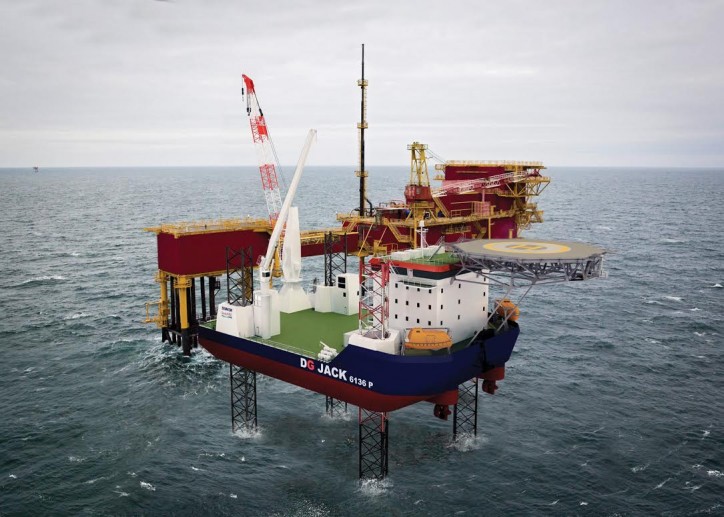A new total solution jack-up was introduced at OTC Houston. DG Jack is the result of a collaboration between Damen and GustoMSC
At this year’s OTC in Houston the Damen Shipyards Group and GustoMSC announced the forming of a collaboration in order to produce a range of self-propelled and non-self-propelled jack-up platforms for the offshore industries – the DG JACK range. The collaboration will be based on GustoMSC’s strong track record in the design of jack-ups and provision of jacking systems, combined with Damen’s extensive experience in shipbuilding and vessel optimisation, financing and worldwide after-sales services.
Image: Damen
GustoMSC Managing Director Nils van Nood said of the collaboration: “We are very pleased to team-up with Damen to provide their clients proven and reliable jack-up solutions. These jack-ups form an expansion of the Damen portfolio targeting the offshore markets in oil & gas, renewables like offshore wind, and civil construction. The jack-ups will be based on GustoMSC’s proven designs and will include GustoMSC’s proven jacking systems.
“As a result of this collaboration the joint Damen and GustoMSC team is fully aligned to provide an optimised solution covering the complete lifecycle of the units, including the design, the construction and delivery as well as the services during operational life. The future owners of these jack-ups will enjoy a product of combined Damen and GustoMSC quality and they will experience first class global services.”
This arrangement provides the market with a total solution, drawing on the extensive experience of both companies, and on the wealth of knowledge within the Dutch maritime industry. Working together in this way, GustoMSC and Damen will be able to offer total control over the entire process, covering everything from basic design, through construction, to after-sales care – anywhere in the world.
Damen Chief Commercial Officer Arnout Damen explained: “The collaboration between Damen and GustoMSC represents a considered response to the needs of the entire offshore industry. It provides operators with a reliable, effective solution, combining GustoMSC’s expertise in design and engineering with Damen’s knowledge of construction, quality, outfitting, after sales service and finance options.
“We are looking forward to working with GustoMSC on the development of this range. The DG JACK will provide a bridge between the offshore energy sectors and offer the versatility to carry out multiple and varied tasks, safely, efficiently and at competitive rates, in line with market expectations”
The decision to partner up and produce the DG JACK range is based upon feedback from the offshore markets. DG JACKs will operate across the offshore spectrum, in both renewable and non-renewable sectors.
Damen Head of Business Development Peter Robert explained: “In the oil & gas markets, the demand for self-elevating service vessels such as the DG JACK range is driven largely by operation and maintenance (O&M) requirements. Age significantly increases the amount of topside repair, maintenance and refurbishment the operator must undertake for the platform to remain serviceable and compliant. In such circumstances the DG JACK represents an extremely cost-effective solution.
“At the same time, shallow water offshore fields remain a major source of production. With enhanced technology and recovery, combined with the relatively low cost of production compared to deep and ultra-deep water locations, such sites will ensure a continuing demand for the DG JACK range, particularly at this time of low oil prices.”
Mr Robert also stated that trends in the offshore wind industry gave the DG JACK range an assured welcome: “Wind turbine capacity has grown 41.1% from 2010 to 2015. In 2015, the average capacity of new wind turbines installed was 4.2 MW, a significant increase from 3.0 MW in 2010, reflecting a period of continuous development in turbine technology to increase energy yields at sea. The deployment of 4-6 MW turbines seen in 2015 will be followed by the gradual introduction of 6-8 MW turbines closer towards 2018.”
Operational experience to date has shown that jack-up vessel intervention has been required at operational wind-farms to correct failures in relation to main components, both for isolated defects and to introduce design improvements. Most of the interventions have been in relation to early operational life and there is currently only a limited experience from offshore wind turbines on longer-term wear out rates and the typical length of life for critical main components, including blades, generators, transformers and gearboxes.
Consents granted to forthcoming projects indicate that this trend of scaling up is set to continue in the long term. Also, the fact that wind farms are placed farther offshore and in deeper water, means different capabilities are required than those seen in the current fleet of jack-ups operating in offshore wind. And, with the design life of offshore wind farms being between 20 and 25 years, routine operation and maintenance tasks are assured to ensure performance optimisation.
Source: Damen

